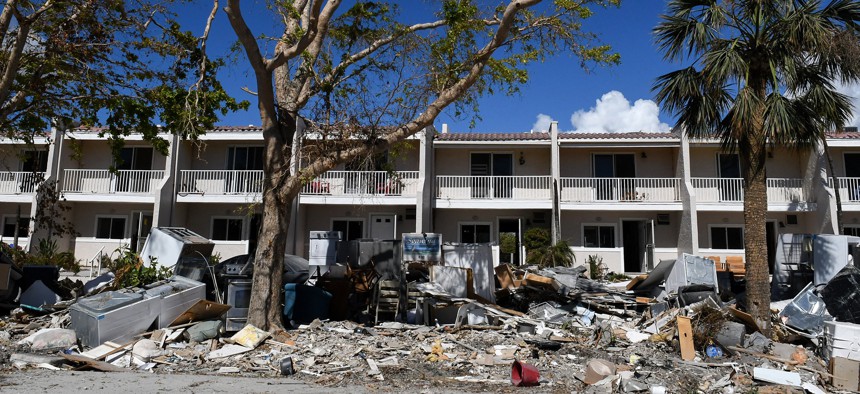Cross-state neighbors helping neighbors in Florida after the storm
Smaller organizations are pitching in to help victims of Hurricane Ian. People need to know 'they are not alone,' one advocate said.

Debris from the Seawind Condominiums is seen along the road in Sanibel Island, Florida on Oct. 31, 2022, over a month after Hurricane Ian made landfall as a Category 4 hurricane. The storm caused an estimated $67 billion in insured losses and at least 127 storm-related deaths in Florida. Photo by Paul Hennessy/SOPA Images/LightRocket via Getty Images
After a major storm, the big disaster response organizations usually get most of the attention: the Red Cross, FEMA, the state’s Division of Emergency Management. But now, after Hurricane Ian, smaller grassroots groups also are helping out.
Take the United Way of Palm Beach County. It’s one of many smaller groups involved both on the ground and providing support from outside the area. Traver McLaughlin, its senior vice president, says his United Way group has been helping people in Lee and Charlotte counties and other hard-hit areas.
“We have had about 1,800 volunteers on the ground, and we have been serving meals daily,” McLaughlin tells City & State. “We are also providing supplies … items such as hygiene kits, cleaning supplies, non-perishable food and other things that people really need. We have been providing food boxes for front line workers and people who are doing hard physical work.”
Moreover, they have “been running 11 shelters. We are working to help people return to their homes,” he adds.
“We need to buy items and supplies. … When people want to come and do volunteer work, we have to make sure the environment is safe. We have many of our volunteers pack food and hand out food to people who are in need or are doing clean up work,” McLaughlin says.
Others are dealing with the emotional damages of the storm. Valerie’s House in Fort Myers is helping victims process grief, of losing jobs, homes, even family members. “Many of the families we are helping have been without power for more than two weeks because of Ian. We worked to provide generators and reconnect people to electricity. We want to provide support so people know they are not alone,” says Angela Melvin, CEO of Valerie’s House.
The group’s volunteers will look for ways to help people who are struggling with storm recovery. “A woman who recently lost her husband now realizes she is really on her own. Maybe her late husband would put up shutters before a hurricane. Now there is no one to do it. We will help put up shutters for people in need. Or we will help cut trees or clear away branches and debris,” Melvin says.
Still others are collecting basic food and hygiene items and providing it to families in the Fort Myers area. Ronda Ferguson-Cobb, president of Sisters on the Move, is leading an effort to help people in and around Fort Myers. The organization is based in Miami-Dade County and some volunteers remember Hurricane Andrew in 1992, she says.
Sisters on the Move went to Fort Myers over one recent weekend to see what they could do. They focused on an area known as Harlem Heights, full of severely damaged homes and still flooded areas. Many residents lost all their furniture and their walls need to be ripped out and replaced after interior flooding. Volunteers saw piles and piles of ruined furniture outside homes, Ferguson-Cobb says.
Sisters on the Move is distributing items such as cleaning supplies, hygiene products and non-perishable food, items requested by residents. Ferguson-Cobb says she knows it will be hard for many: “We’re raising money to provide supplies to help there. They suffered a lot of water damage. (But) our volunteers remember other hurricanes … we know how to help people who (went) through Ian.”
Florida First Lady Casey DeSantis announced new mental health resiliency tools in response to the hurricane Ian, and the Florida Department of Children and Families (DCF) launched a Family Support Line. This connects individuals and families who were affected by Hurricane Ian with peers who recovered from Hurricane Michael. Volunteers from the Panhandle will use their personal experiences to provide support, advice and general help to victims of Ian, according to a press release.
Also, the Florida Department of Health (DOH) and DCF have partnered with BetterHelp to offer mental health services through three months of free online therapy to those impacted by Hurricane Ian. Also, Mrs. DeSantis has worked with Sara Newhouse, the state Disaster Recovery Mental Health Coordinator, to compile a webpage of resources to help residents and first responders navigate resources for mental health needs following the hurricane.
—
The Disaster Distress Helpline is a 24/7, 365-day-a-year, national hotline dedicated to providing immediate crisis counseling for people who are experiencing emotional distress related to any natural or human-caused disaster. This toll-free, multilingual, and confidential crisis support service is available to all residents in the United States and its territories. Stress, anxiety, and other depression-like symptoms are common reactions after a disaster. Call or text 1-800-985-5990 to connect with a trained crisis counselor.
David Volz has been a reporter for numerous community news publications throughout South Florida over the past two decades, as well as the South Florida Sun-Sentinel, Miami Herald and South Florida Business Journal. He covers local government, schools, sports, culture, faith groups and workplaces.
NEXT STORY: Florida gasoline prices to rise as tax ‘holiday’ ends